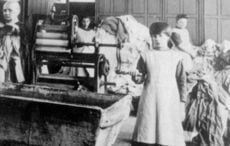THERE'S a somewhat obscure 1959 movie starring Paul Newman called The Young Philadelphians that came to my mind recently, as George Clooney's latest movie Michael Clayton opened in theaters. In The Young Philadelphians Newman plays an ambitious lawyer trying to climb his way into the City of Brotherly Love's upper crust. That's only possible, however, if he hides a certain fact of life -- that his father was a salt-of-the earth, off-the-boat Irish politician.
This does not stop Newman's character from committing some troubling acts when he is confronted by another immigrant son (an Italian).
These days, when anyone who ever had a great-grandparent who may have been born in Dublin or Ulster claims to be Irish, concealing one's Irish immigrant dad seems an absurd act.
More interestingly, the Newman movie seems to imply that this guy may not be royalty, but he's willing to screw over an ethnic kid slightly lower on the social ladder.
Or was that the WASP in him coming out?
This all came to mind as I was pondering the Irish angle in the new Clooney movie, which earned only $11 million this past weekend but garnered excellent reviews.
Clooney plays a "fixer" who is employed by high-powered types to clean up loose ends which might embarrass equally high-powered types.
The movie goes to some length to incorporate Clayton's Irish American background into his character. His dad is a retired cop, and there is a strong tradition of civil service work in the Clayton clan. No real stretch there.
Things get more interesting when it is implied that Michael's work for the elite -- cleaning their dirty laundry -- is somehow a betrayal of his upbringing.
In fact, when Clayton has a crisis of conscience, it could be argued that he is merely reverting to his true Irish American soul, which is inherently good and, thus, should be contemptuous of these scoundrels.
There are positive and negative ways of looking at this. You could be cynical and say that Irish Americans have themselves so thoroughly penetrated the American elite that it is a little crazy to suggest that they are some sort of blue collar force of all that is just.
In short, it still seems that the Irish are the salt-of-the-American-earth.
You could also say the Irish in America are so thoroughly assimilated that they really don't matter anymore. This is a tempting argument, but off the mark.
Which is why I would say I'm impressed that the makers of Michael Clayton used the main character's ethnic background in such a multi-faceted way.
Again, you can argue with it. But I wouldn't dismiss it. The fact that there continues to be a debate over what it means to be Irish American, to me, is valuable.
There are countless movies -- and books and biographies -- that are explicitly Irish American, and make clear and direct pronouncement about what it means to be Irish. We should pay more attention to movies such as The Young Philadelphians, and now Michael Clayton, because they seek to explain how one's roots dictate thought and behavior -- perhaps even destiny.
For what seems to be a very different take on what it means to be Irish, it might be worth your while to pick up Ann Patchett's new book Run. I have not yet read this novel, but will, because it has been widely reviewed and directly confronts key themes in the Irish American experience.
Run revolves around a former mayor of Boston, that heavily Irish town which was scarred by the bussing crisis of the mid-1970s, which pit working class Irish Americans against blacks.
Patchett's previous novel, Bel Canto, was a huge success, so critics have trampled over themselves to look at her latest. In Run, the former Boston mayor has adopted two African American boys and named then Tip and Teddy, after two of Boston's most famous Irish pols. The past collides with the present on a snowy night during a lecture by Jesse Jackson.
It may turn out, upon reading, that Pachett's vision of Irish America is hokey, clunky or even silly. But, again, the mere fact that we continue to debate these issues is impressive.
(Contact Tom at [email protected])




Comments